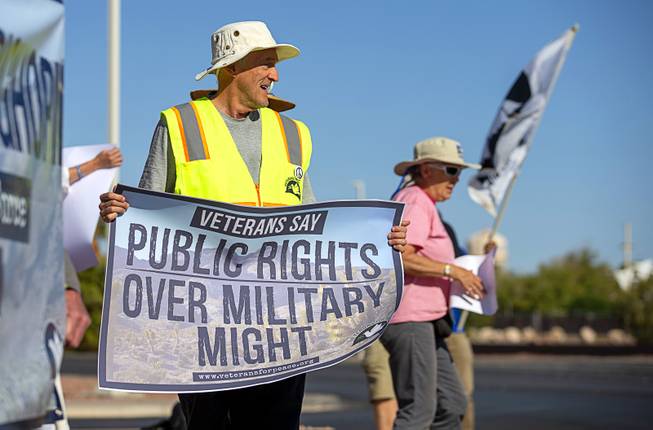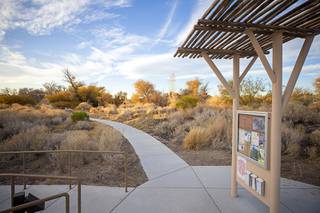
Veterans For Peace protester Daniel Knox of Lake Havasu City, Ariz. holds a sign at the main entrance to Nellis Air Force Base Thursday, Oct. 3, 2019. The group is opposed to a plan that would expand the Nevada Test and Training Range into the Desert National Wildlife Refuge.
Saturday, Dec. 21, 2019 | 2 a.m.
Nevada’s federal delegation is hoping to broker a compromise in the ongoing argument around a proposed military expansion into the Desert National Wildlife Refuge.
Sen. Catherine Cortez Masto, D-Nev., led the Nevada delegation in introducing a bill Thursday that aims to facilitate an agreement palatable to groups including the military and environmental organizations in regard to the expansion.
The bill would limit the expansion of the Nevada Test and Training Range to 98,000 acres — 48,000 acres in the refuge and 50,000 acres of non-refuge land that would serve as a buffer. That’s a significant decrease from the 300,000 acres the U.S. Air Force originally proposed taking over.
“Our legislation addresses the concerns of our community while also ensuring the Air Force has the resources and support it needs to keep our country safe. In my extensive engagement with Nevadans, it was clear that our local communities needed more of a say in the process so that local economies are protected, religious and cultural sites of importance to our Native communities are respected and all those who frequent these beautiful natural spaces can enjoy them,” Cortez Masto said in a statement.
The bill is supported by the entire Nevada congressional delegation. Democratic Nevada Rep. Steven Horsford, whose district makes up most of North Las Vegas and a large section of rural area in the state, is expected to carry the House version of the bill.
“I am honored that our state is so crucial to our country’s national defense; however, the Department of Defense already has nearly 3 million acres in southern Nevada for testing and training — with a portion of more than 800,000 acres of the Refuge already closed to public access,” Horsford said in a statement. “Despite overwhelming public opposition, the Department of Defense has not reconsidered any portion of its proposal, which would close most of the refuge to public access and threaten Nevada’s state animal — the bighorn sheep.”
The bill would also designate over 1.3 million acres in the refuge as wilderness areas, which would protect them from significant encroachment and development.
The Desert National Wildlife Refuge spreads over 1.6 million acres of the Mojave Desert. The expansion has been strongly opposed since its introduction, with the Nevada Legislature and the Moapa Band of Paiutes enacting resolutions opposing it. In the push for the 2020 Democratic nomination, multiple presidential candidates have also come out against the proposal.
In a statement from the Nevada Conservation League, executive director Andy Maggi said the group applauds Cortez Masto’s effort to block the expansion.
“This agreement will preserve public access to the Refuge, conserve the ecosystem upon which critical species like the bighorn sheep thrive, and honor the connection Paiute communities have with this land — all the while balancing our national security needs,” Maggi said in the statement.
Annette Magnus, the executive director of Battle Born Progress, a nonprofit progressive advocacy group, called Cortez Masto’s leadership “bold and visionary.”
“This is the largest wilderness bill in Nevada history. This bill protects the largest wildlife refuge in the continental US that was established to provide habitat for the iconic desert bighorn sheep,” Magnus said in a statement. “This bill now provides the highest level of protection we can give these lands and it will guarantee the military cannot keep coming back and trying to take more of our refuge lands in the future.”
Patrick Donnelly, the executive director of the Nevada Center for Biological Diversity, was slightly more critical, stating that while the rejection of the Air Force expansion attempt was welcome, he would rather see no encroachment at all on the refuge.
“Nevada’s desert has been treated like a national sacrifice area for far too long. Losing an area larger than the city of Las Vegas isn’t a victory for our endangered species or for people, even if it’s accompanied by wilderness designation,” Donnelly said in a statement. “The final bill needs to ensure that Nevada’s wildlife doesn’t lose out to military expansion.”

